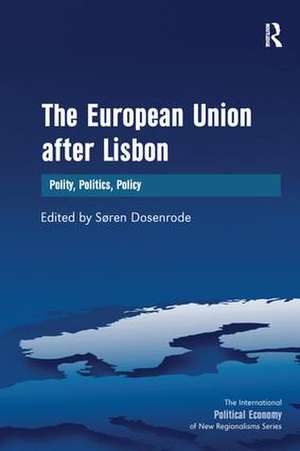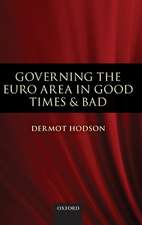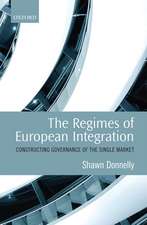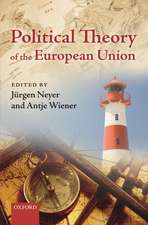The European Union after Lisbon: Polity, Politics, Policy: New Regionalisms Series
Editat de Søren Dosenrodeen Limba Engleză Paperback – 17 oct 2016
| Toate formatele și edițiile | Preț | Express |
|---|---|---|
| Paperback (1) | 489.26 lei 6-8 săpt. | |
| Taylor & Francis – 17 oct 2016 | 489.26 lei 6-8 săpt. | |
| Hardback (1) | 1109.66 lei 6-8 săpt. | |
| Taylor & Francis – 28 iun 2012 | 1109.66 lei 6-8 săpt. |
Din seria New Regionalisms Series
-
 Preț: 312.34 lei
Preț: 312.34 lei -
 Preț: 311.41 lei
Preț: 311.41 lei -
 Preț: 295.51 lei
Preț: 295.51 lei - 15%
 Preț: 715.33 lei
Preț: 715.33 lei - 15%
 Preț: 672.40 lei
Preț: 672.40 lei - 18%
 Preț: 1060.25 lei
Preț: 1060.25 lei - 18%
 Preț: 1000.27 lei
Preț: 1000.27 lei -
 Preț: 374.20 lei
Preț: 374.20 lei -
 Preț: 374.58 lei
Preț: 374.58 lei - 26%
 Preț: 818.67 lei
Preț: 818.67 lei - 26%
 Preț: 765.43 lei
Preț: 765.43 lei - 18%
 Preț: 1003.43 lei
Preț: 1003.43 lei - 15%
 Preț: 703.90 lei
Preț: 703.90 lei - 25%
 Preț: 768.10 lei
Preț: 768.10 lei - 25%
 Preț: 766.85 lei
Preț: 766.85 lei - 25%
 Preț: 768.64 lei
Preț: 768.64 lei - 18%
 Preț: 1061.81 lei
Preț: 1061.81 lei -
 Preț: 380.54 lei
Preț: 380.54 lei - 31%
 Preț: 766.31 lei
Preț: 766.31 lei - 25%
 Preț: 769.37 lei
Preț: 769.37 lei - 31%
 Preț: 767.20 lei
Preț: 767.20 lei - 25%
 Preț: 770.98 lei
Preț: 770.98 lei - 18%
 Preț: 1054.71 lei
Preț: 1054.71 lei - 26%
 Preț: 821.82 lei
Preț: 821.82 lei -
 Preț: 369.73 lei
Preț: 369.73 lei - 18%
 Preț: 1057.40 lei
Preț: 1057.40 lei - 18%
 Preț: 1005.01 lei
Preț: 1005.01 lei - 18%
 Preț: 1008.17 lei
Preț: 1008.17 lei - 18%
 Preț: 1109.66 lei
Preț: 1109.66 lei - 15%
 Preț: 669.94 lei
Preț: 669.94 lei - 18%
 Preț: 1055.84 lei
Preț: 1055.84 lei - 18%
 Preț: 1006.60 lei
Preț: 1006.60 lei - 18%
 Preț: 703.30 lei
Preț: 703.30 lei - 15%
 Preț: 703.08 lei
Preț: 703.08 lei - 18%
 Preț: 1056.00 lei
Preț: 1056.00 lei - 25%
 Preț: 825.63 lei
Preț: 825.63 lei - 18%
 Preț: 1056.95 lei
Preț: 1056.95 lei - 18%
 Preț: 1000.27 lei
Preț: 1000.27 lei - 18%
 Preț: 1058.38 lei
Preț: 1058.38 lei - 15%
 Preț: 669.94 lei
Preț: 669.94 lei - 30%
 Preț: 849.78 lei
Preț: 849.78 lei - 28%
 Preț: 822.86 lei
Preț: 822.86 lei - 18%
 Preț: 1005.80 lei
Preț: 1005.80 lei - 18%
 Preț: 1056.28 lei
Preț: 1056.28 lei - 26%
 Preț: 766.31 lei
Preț: 766.31 lei - 18%
 Preț: 1057.09 lei
Preț: 1057.09 lei - 30%
 Preț: 769.37 lei
Preț: 769.37 lei - 18%
 Preț: 1108.37 lei
Preț: 1108.37 lei - 26%
 Preț: 847.31 lei
Preț: 847.31 lei - 28%
 Preț: 737.94 lei
Preț: 737.94 lei
Preț: 489.26 lei
Nou
Puncte Express: 734
Preț estimativ în valută:
93.62€ • 97.75$ • 77.48£
93.62€ • 97.75$ • 77.48£
Carte tipărită la comandă
Livrare economică 04-18 aprilie
Preluare comenzi: 021 569.72.76
Specificații
ISBN-13: 9781138256958
ISBN-10: 1138256951
Pagini: 204
Dimensiuni: 156 x 234 x 11 mm
Greutate: 0.45 kg
Ediția:1
Editura: Taylor & Francis
Colecția Routledge
Seria New Regionalisms Series
Locul publicării:Oxford, United Kingdom
ISBN-10: 1138256951
Pagini: 204
Dimensiuni: 156 x 234 x 11 mm
Greutate: 0.45 kg
Ediția:1
Editura: Taylor & Francis
Colecția Routledge
Seria New Regionalisms Series
Locul publicării:Oxford, United Kingdom
Public țintă
PostgraduateCuprins
Contents: Introduction; Exploring the Lisbon Treaty, Søren Dosenrode; The road to Lisbon, Søren Dosenrode; Assessing the European Union's statehood, Søren Dosenrode; Geographical spillovers, structural power and growing 'agency' post Lisbon, Wolfgang Zank; European security in the Lisbon order, Per Jansson; The reinforcement of fundamental rights in the Lisbon Treaty, Cristina Blasi Casagran; Enhanced cooperation under the Lisbon Treaty, Nico Groenendijk; Designing democratic institutions: legitimacy and the reform of the Council of the European Union in the Lisbon Treaty, Andreas Warntjen; The Spanish presidency - the first presidency under Lisbon Treaty trio (relevant institutional 'acquis' and balance), Blanca Vilà ; Contradictions in the market-creating state in Europe, Lars Niklasson; The Lisbon Treaty - a treaty of polity and politics, Søren Dosenrode; Index.
Notă biografică
Søren Dosenrode is a Professor of International Politics, Jean Monnet Professor of European Studies, and Director of the Centre for Comparative Integration Studies at Aalborg University. He holds an MPhil from the University of Copenhagen, and a DPhil from the University of Zürich. Søren currently heads a research project on indicators for potential regional integration. His latest Ashgate publication was ’The European Union after Lisbon: Polity, Politics, Policy’.
Recenzii
'The European Union is a complex lattice work of ever-changing structures, procedures and issues, making it difficult to understand, let alone appreciate as an important regional phenomenon. This new book on the post-Lisbon European Union is both exceptional and welcome for its clarity, focus, comprehensiveness and relevance. As such, it is a valuable contribution which will be appreciated by practitioners and students alike in their quest for understanding the complexities of the European Union.' Gerrit Olivier, University of Pretoria, South Africa
Descriere
A few years have passed since the Lisbon Treaty came into force but the question still remains of what the Lisbon Treaty has actually brought about. Was it just 'relatively insignificant' as some scholars have claimed, or was it 'something' more? This book sets out to look at this question and it does so by applying a classical division: polity, politics and policy.
















